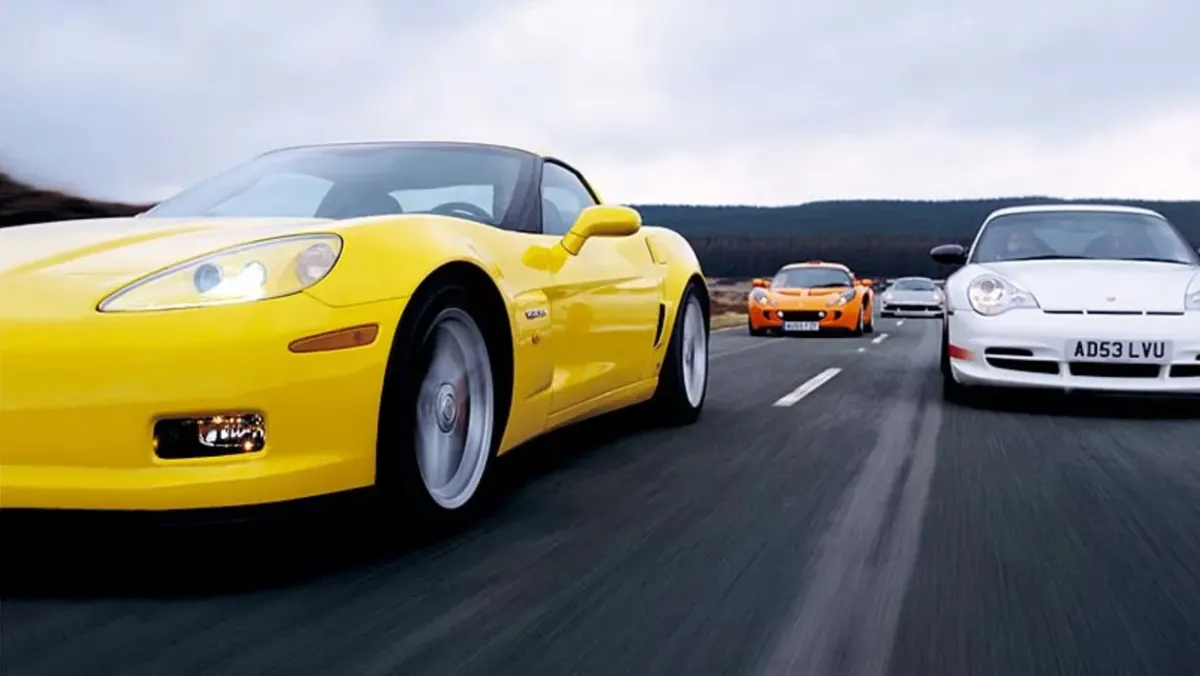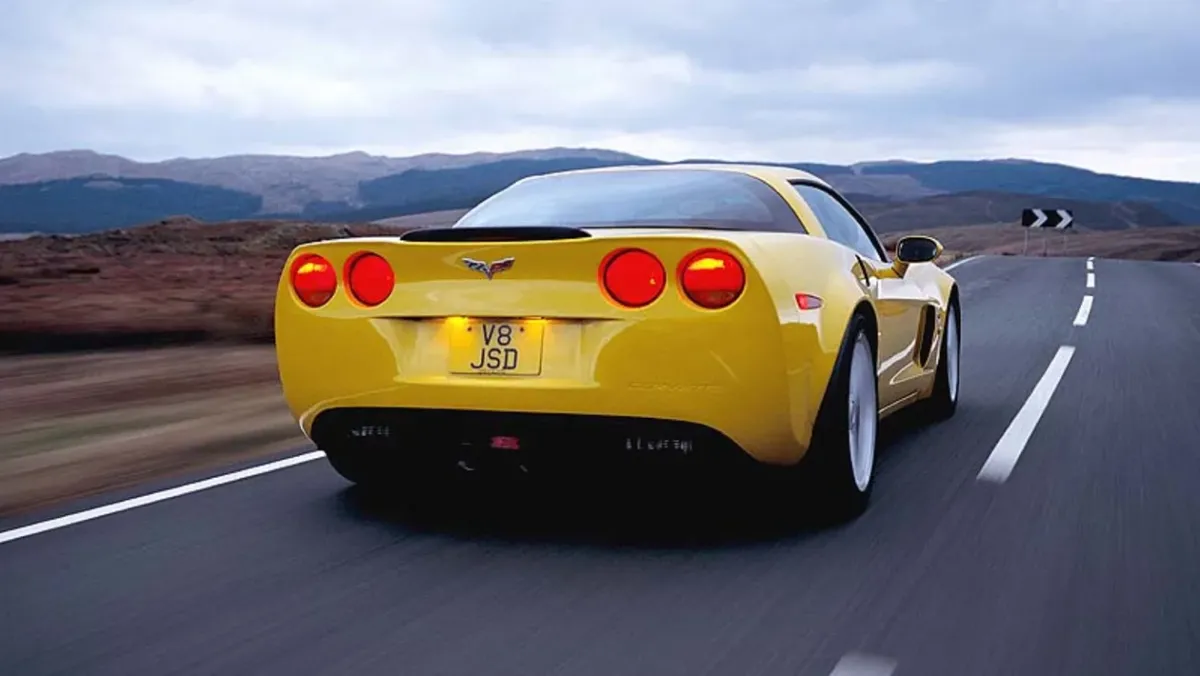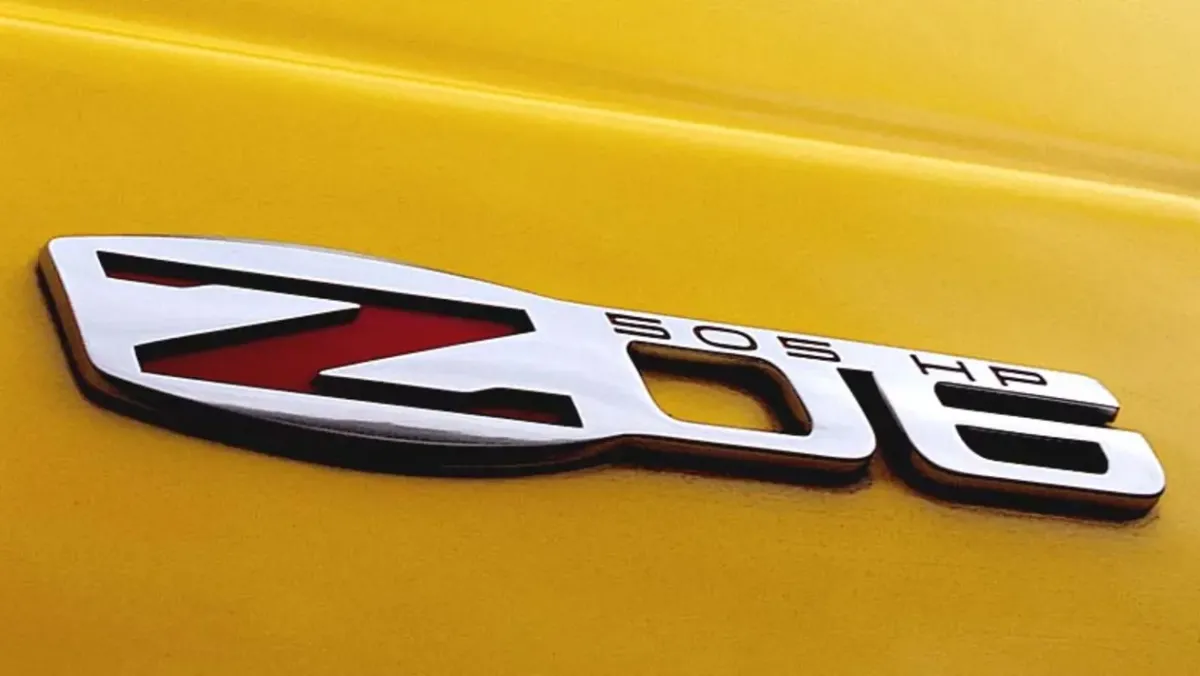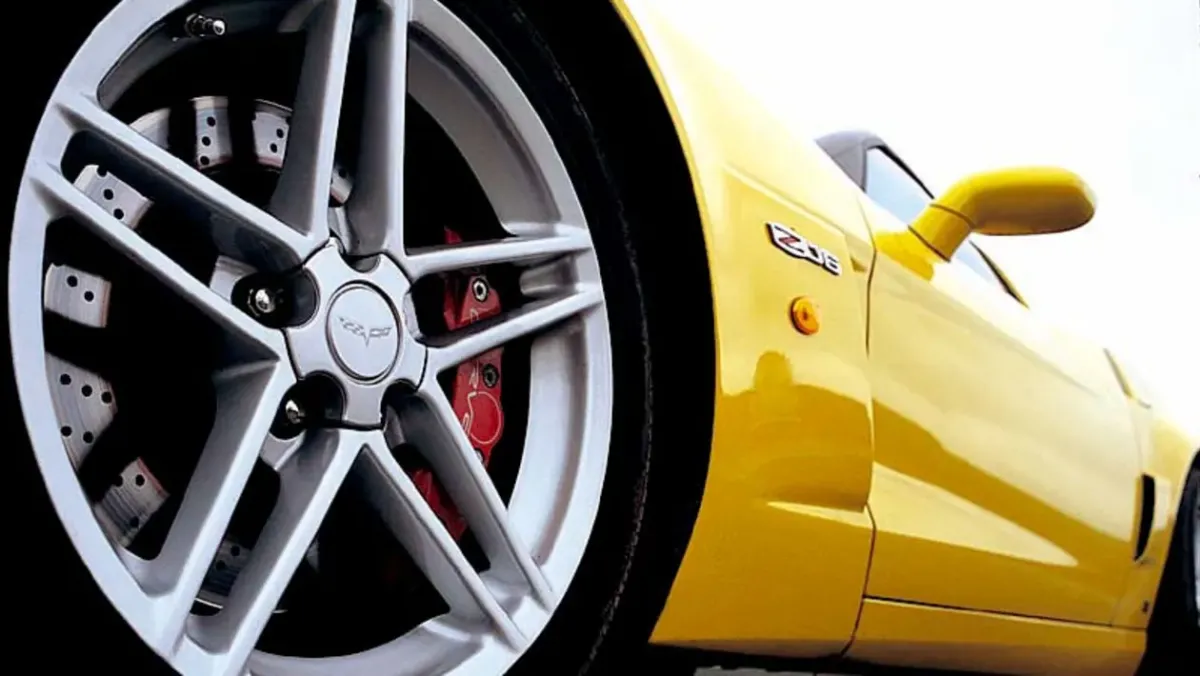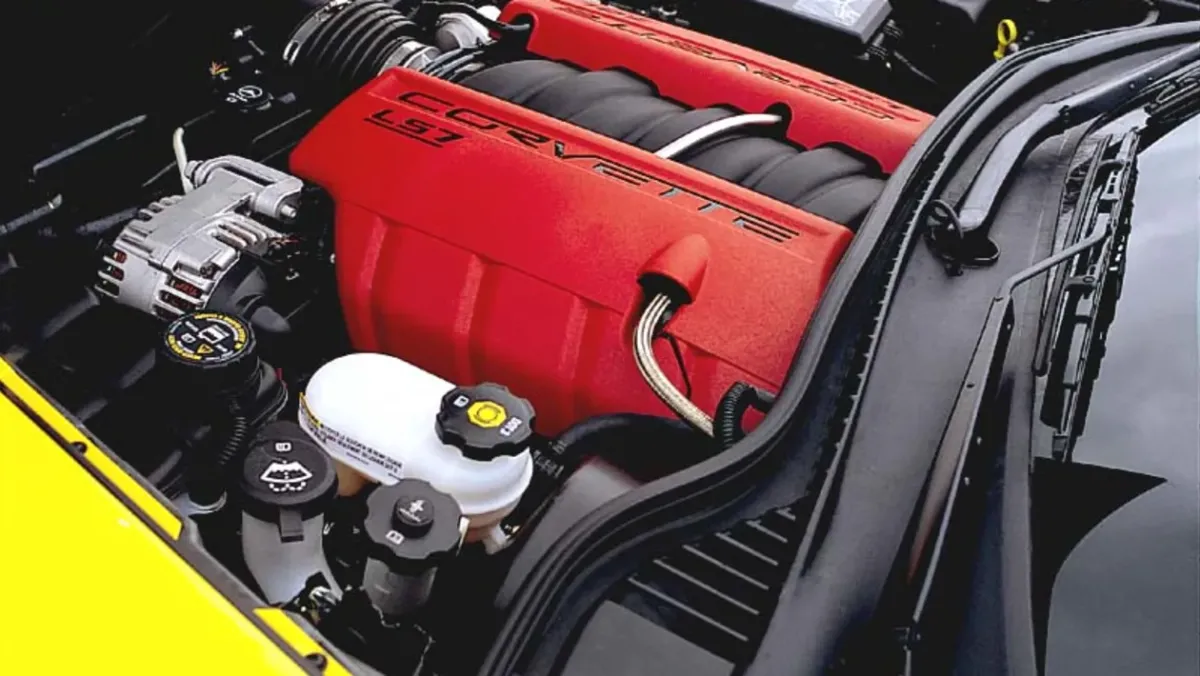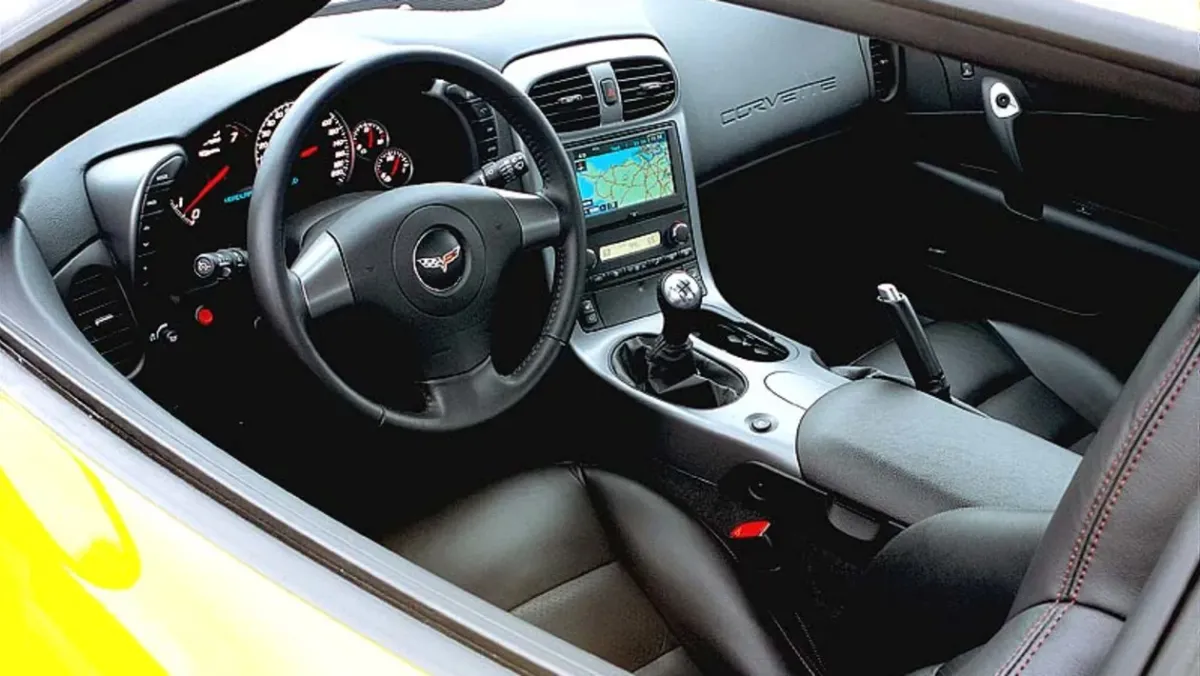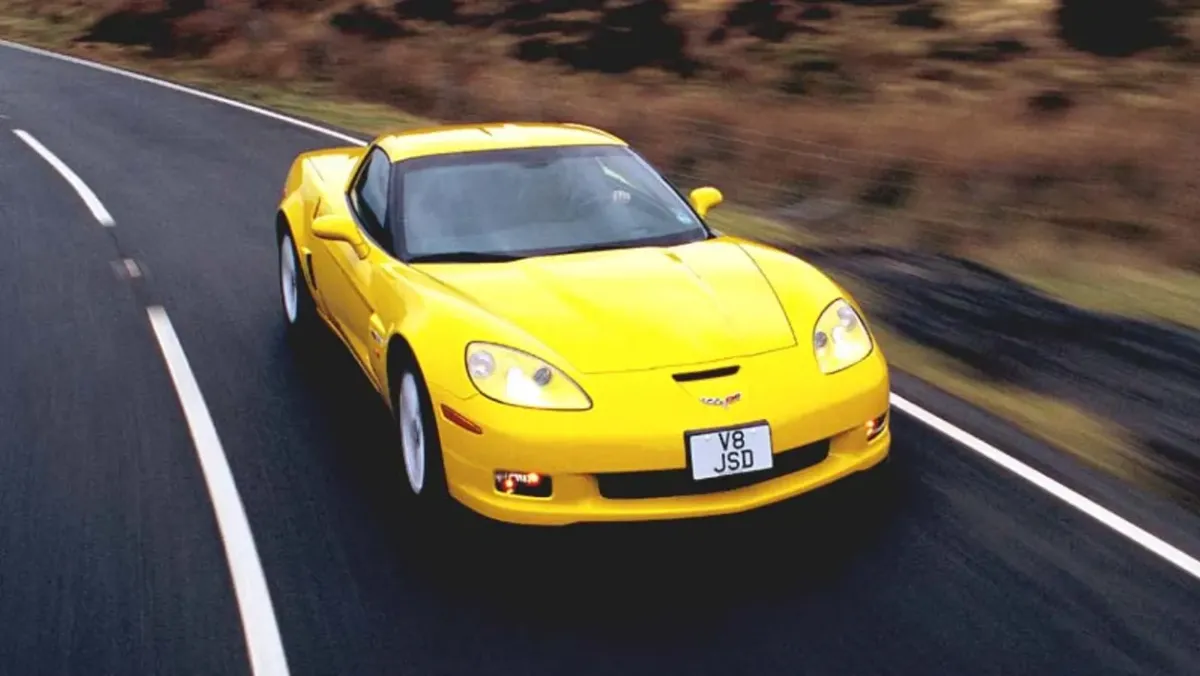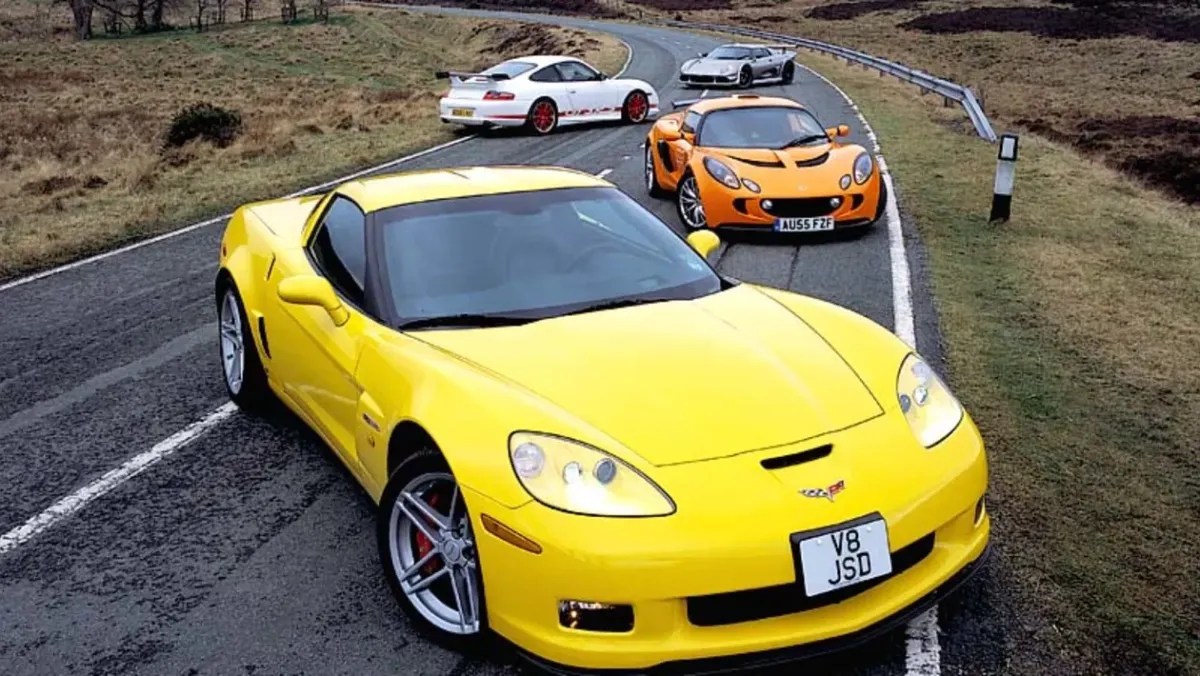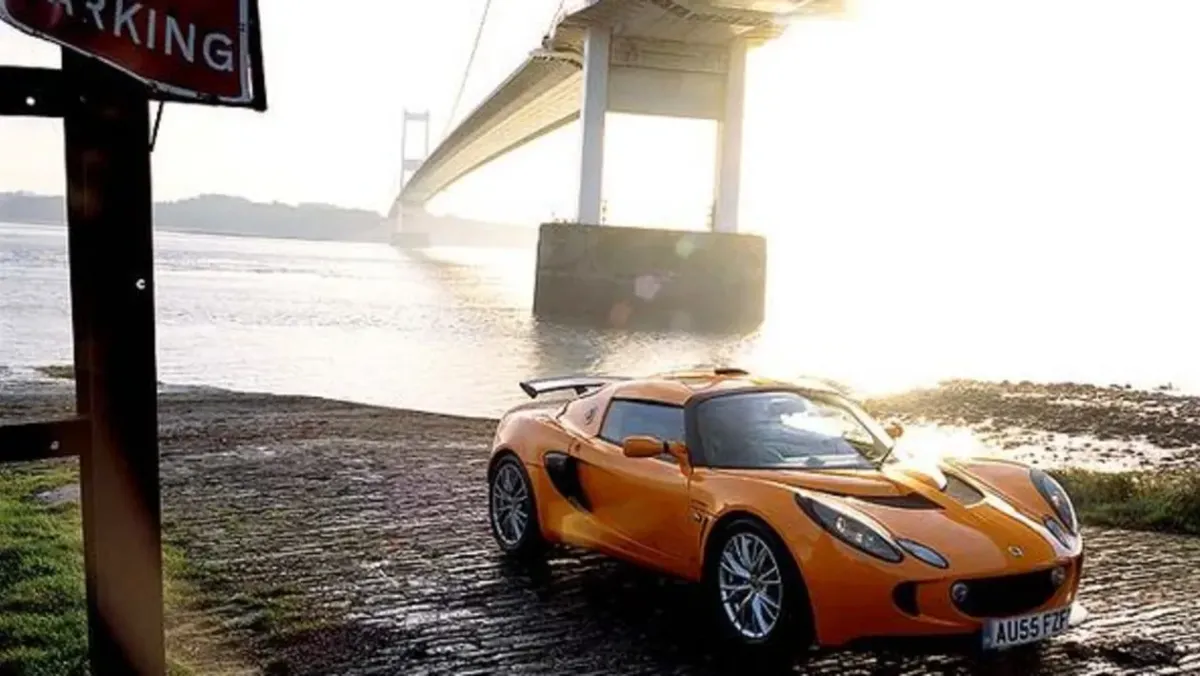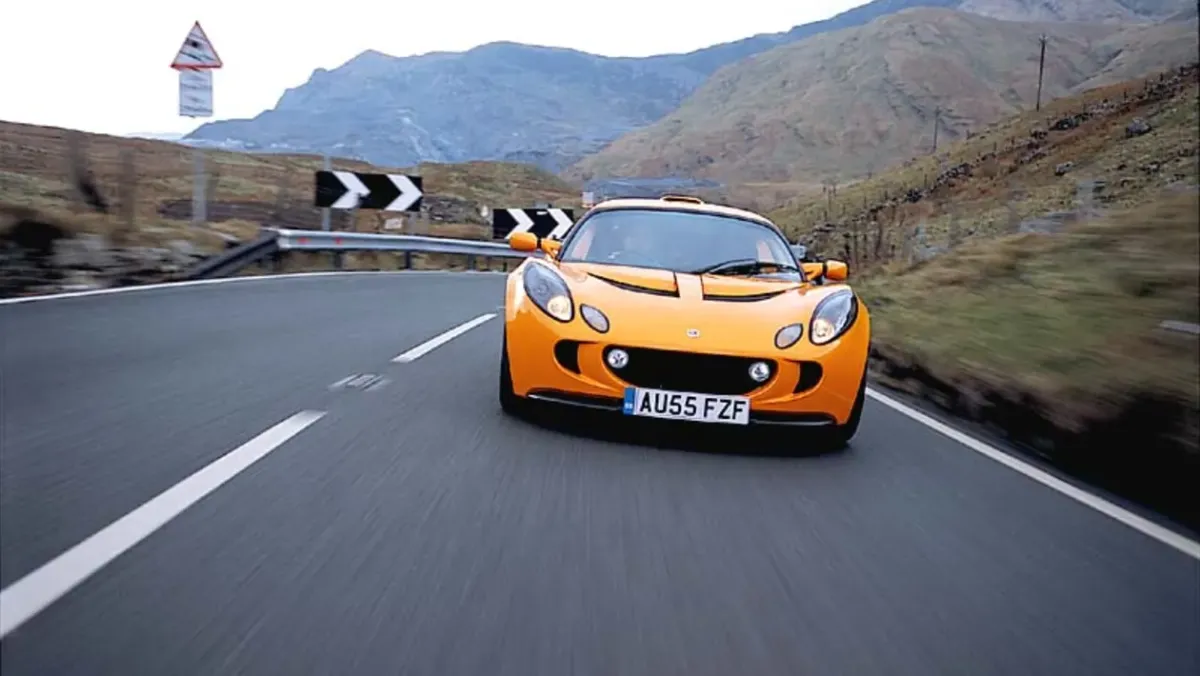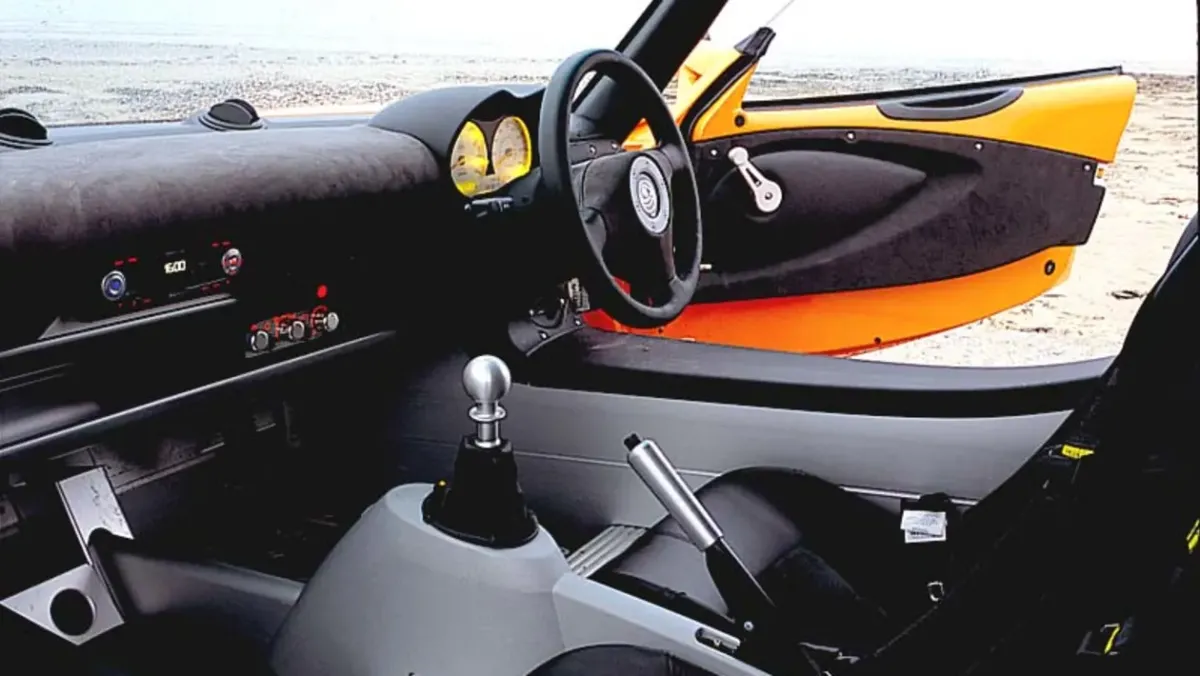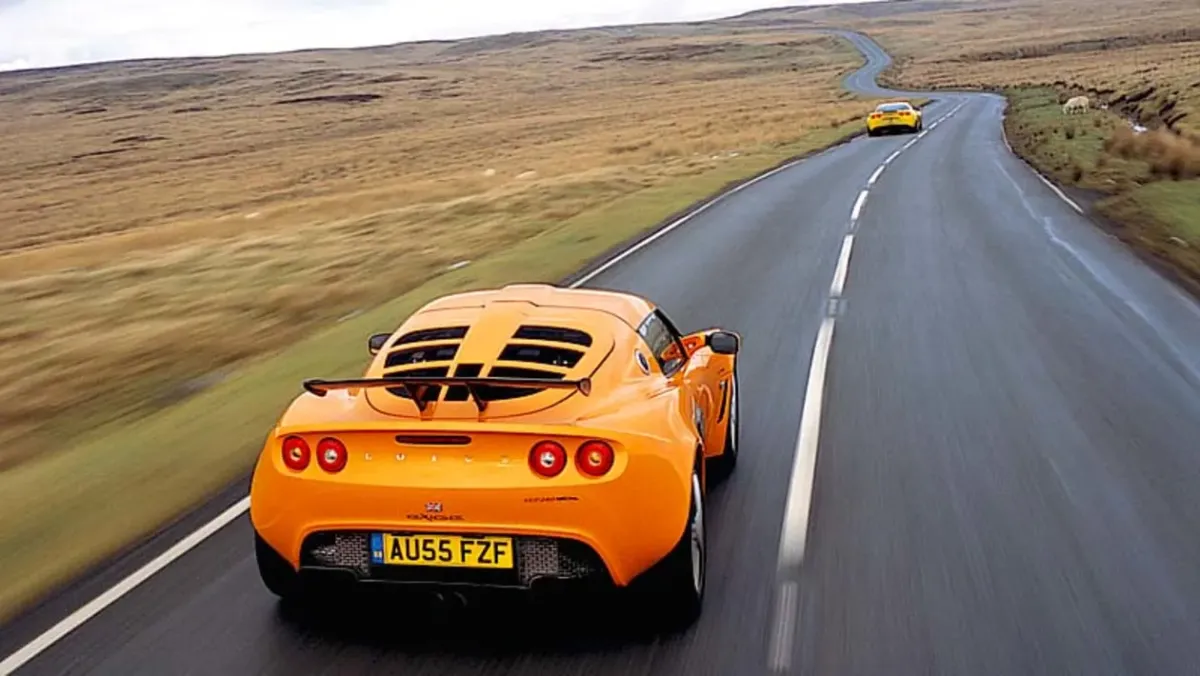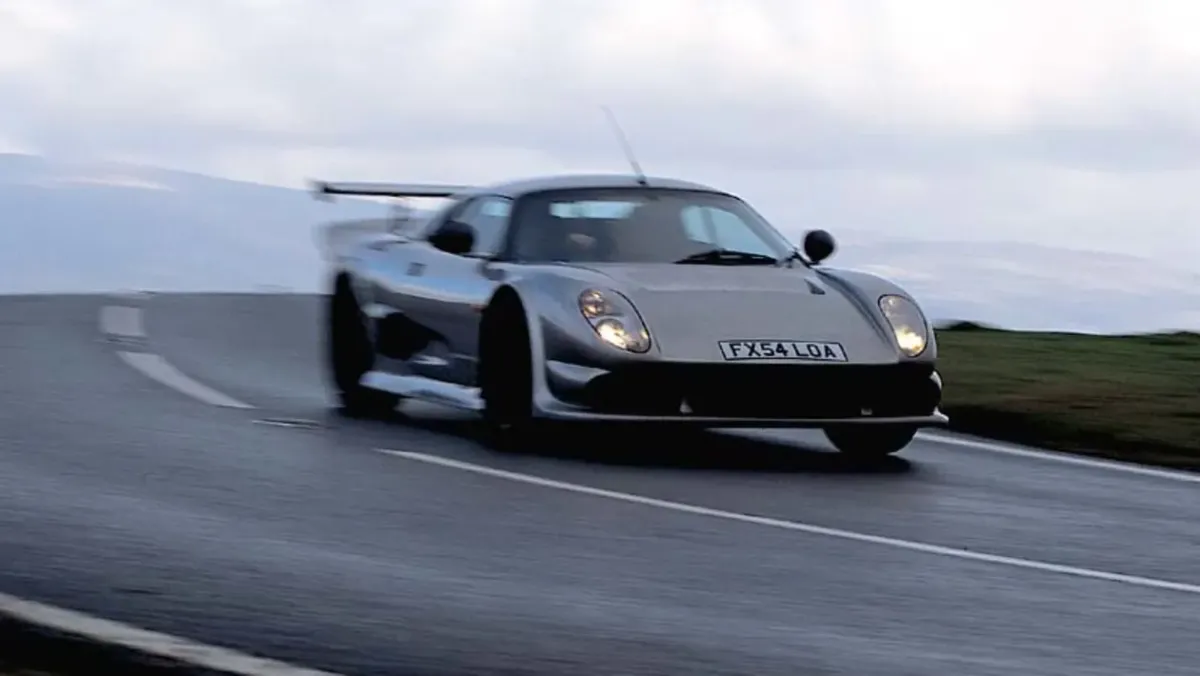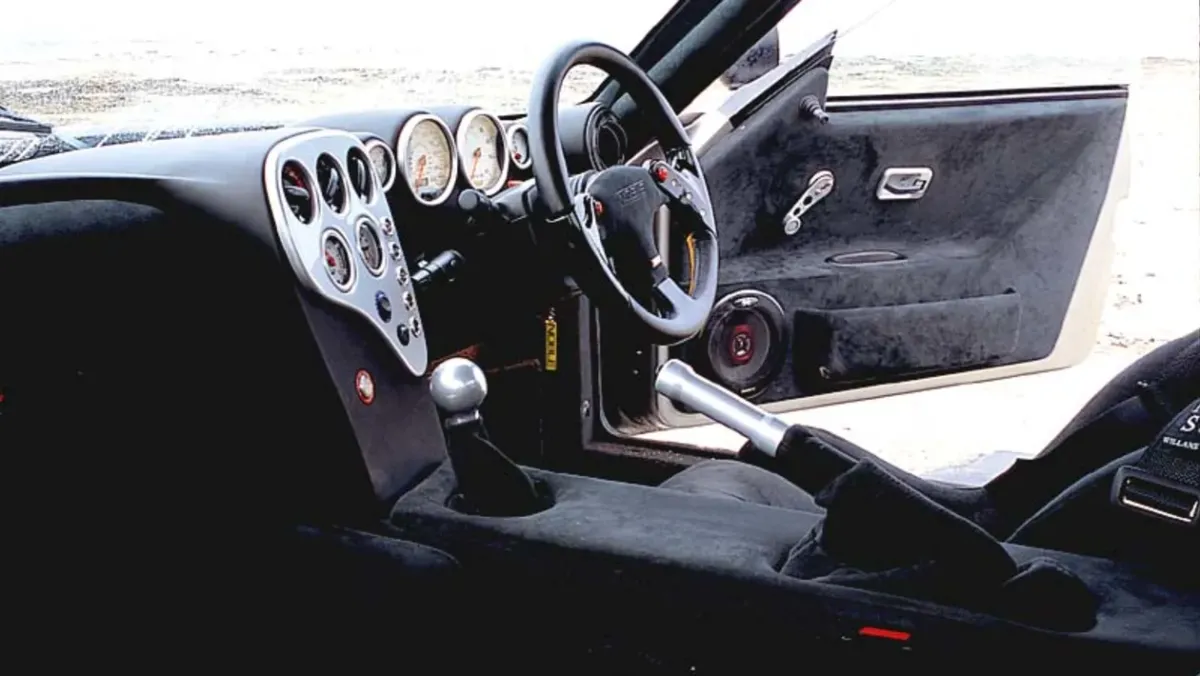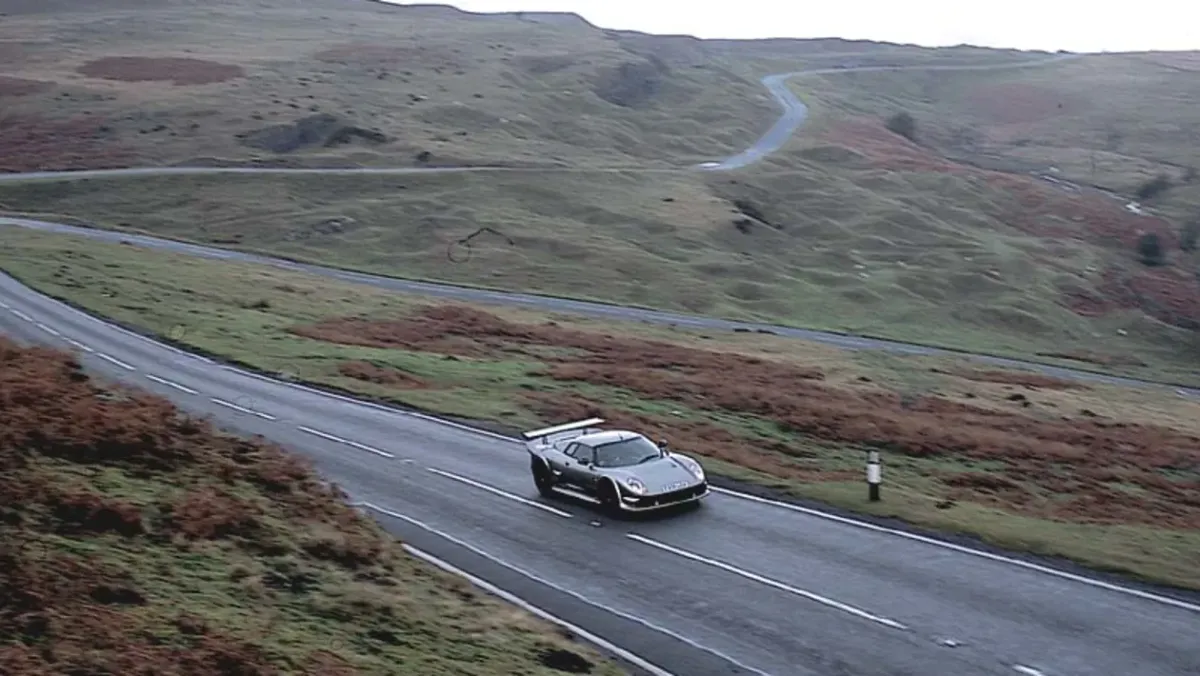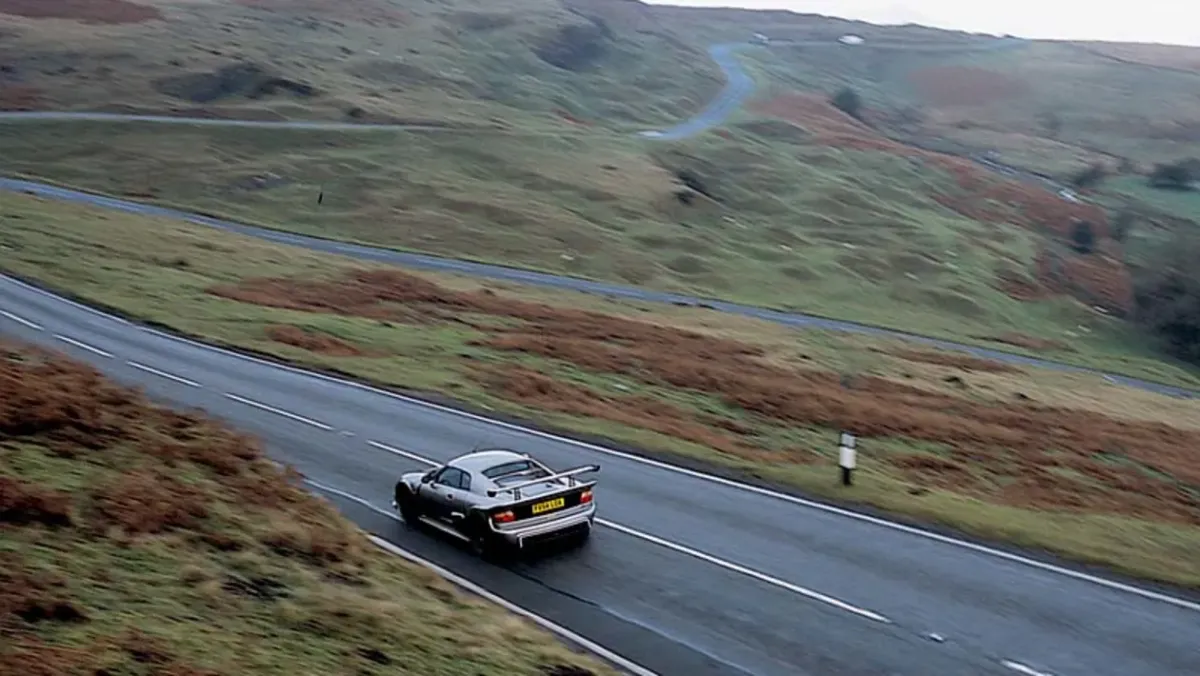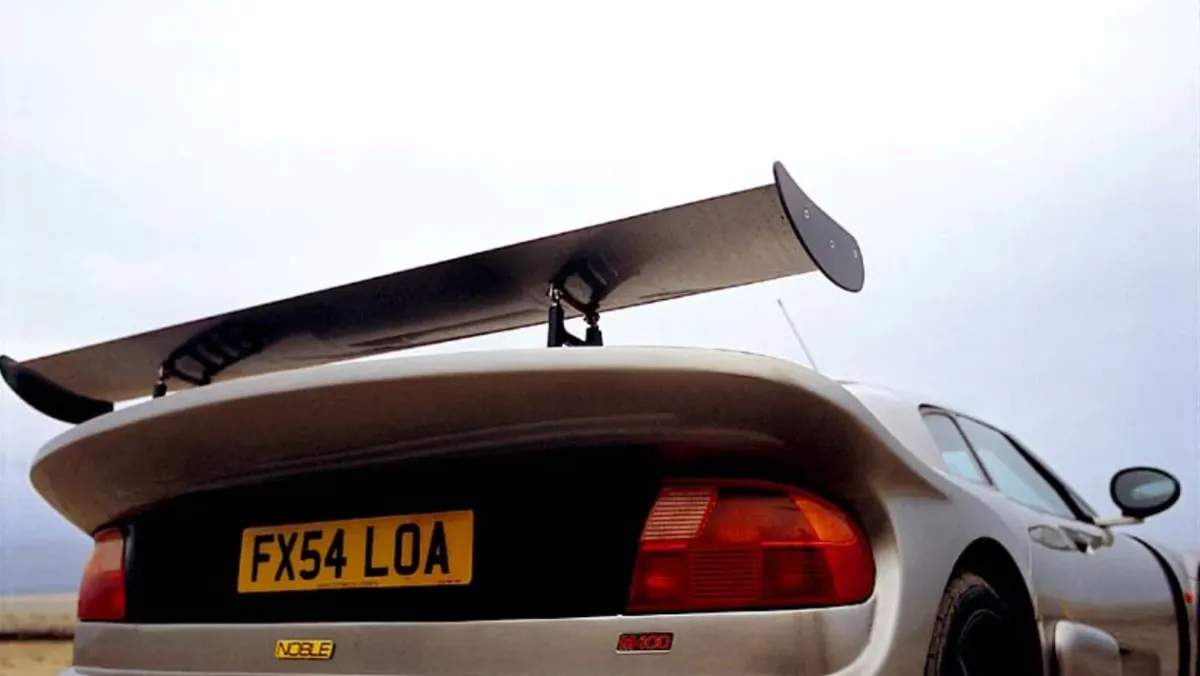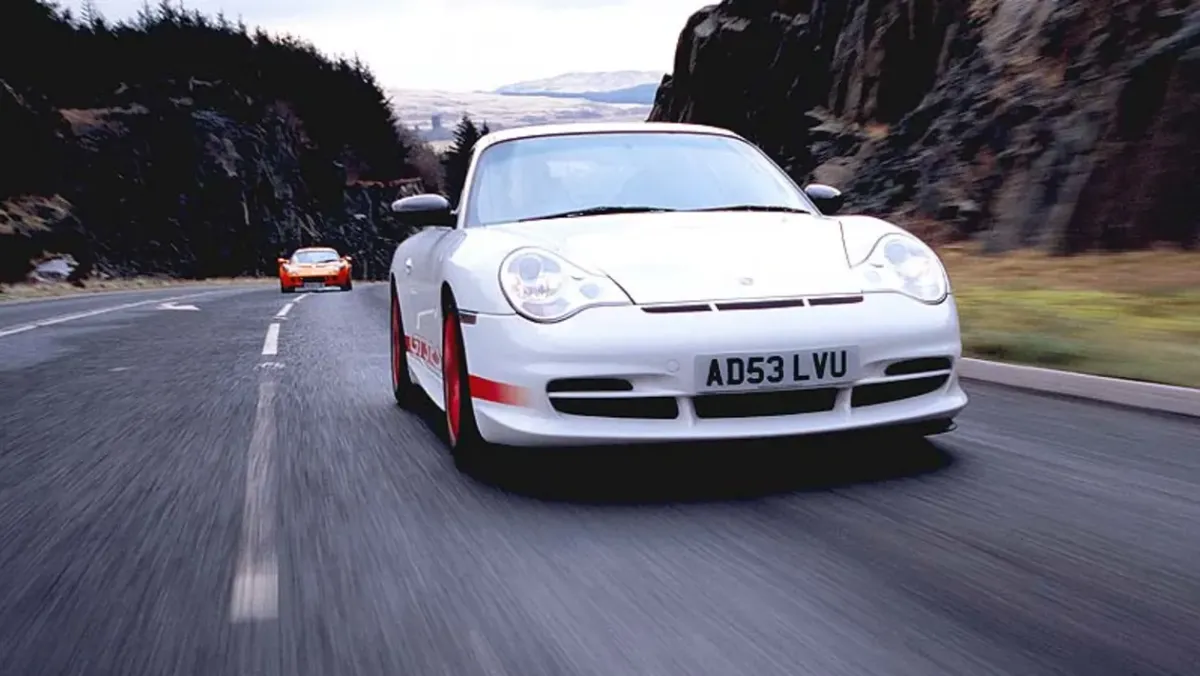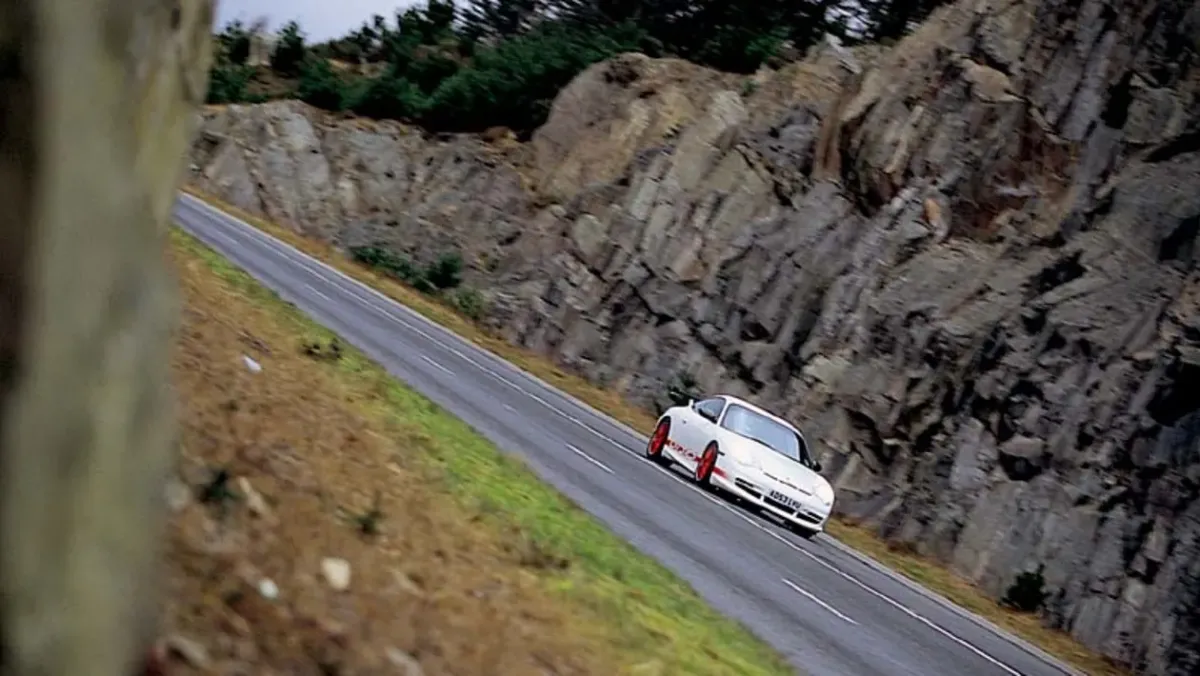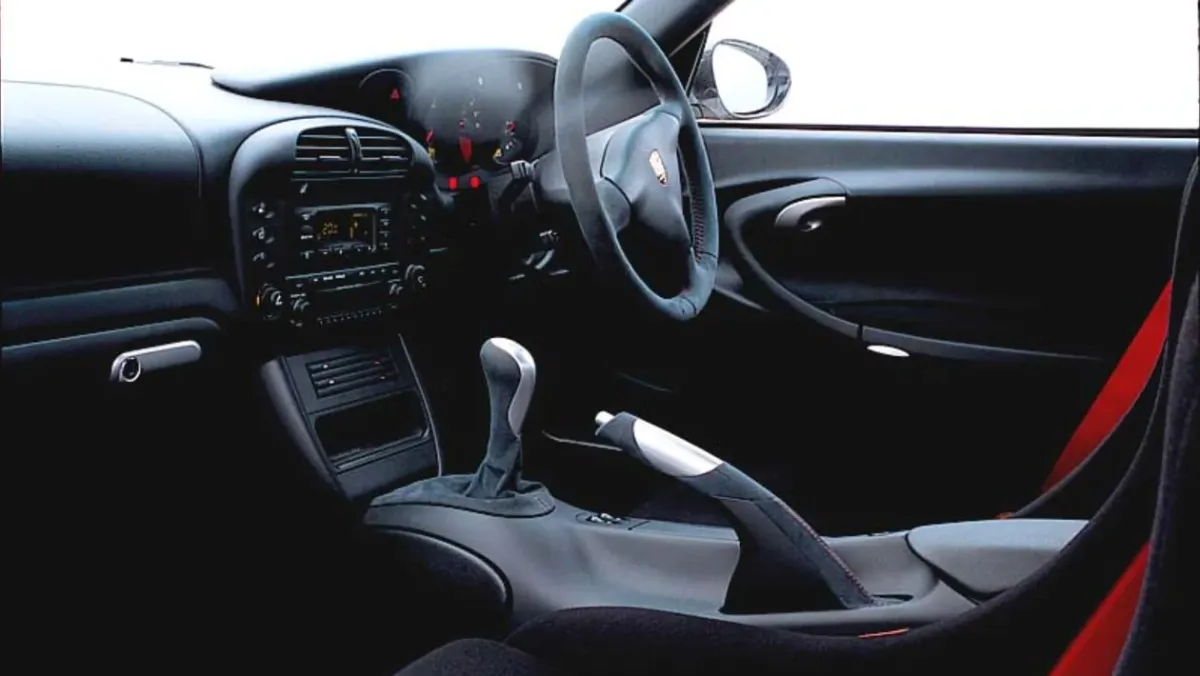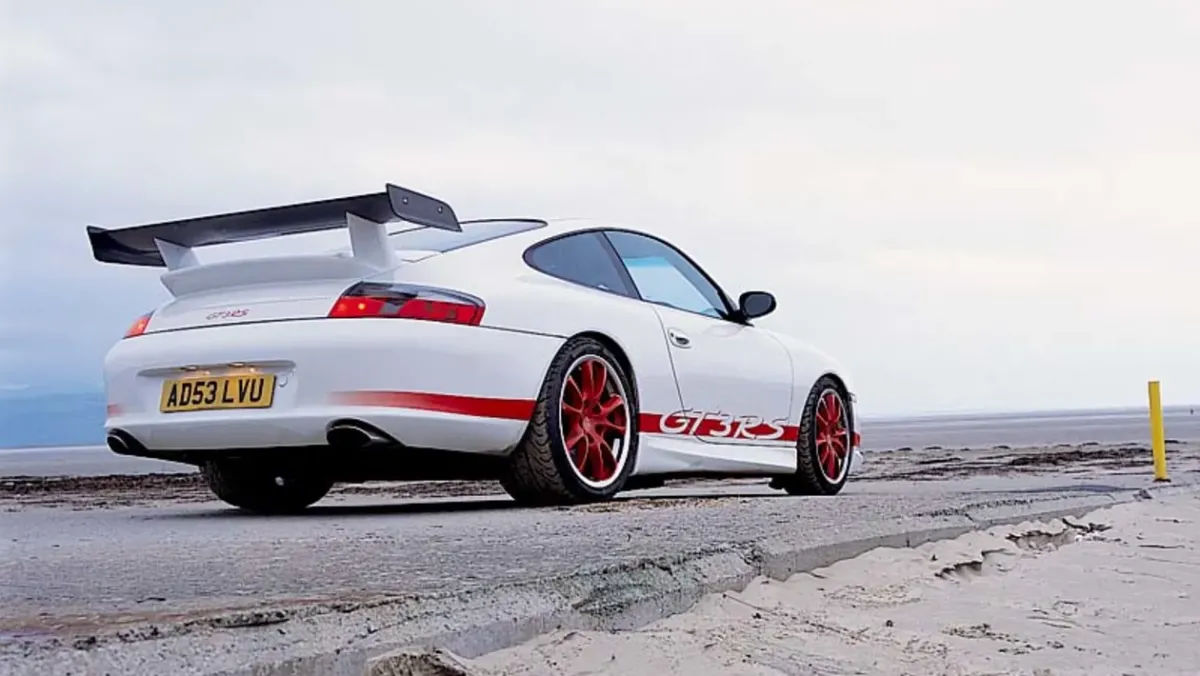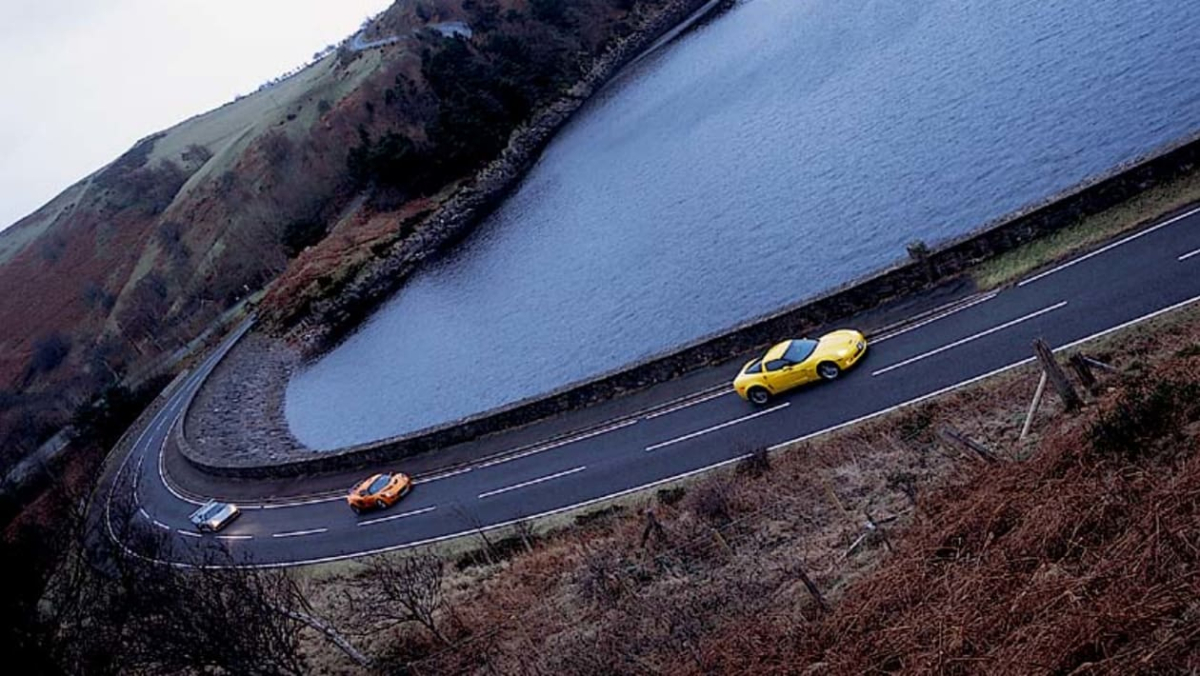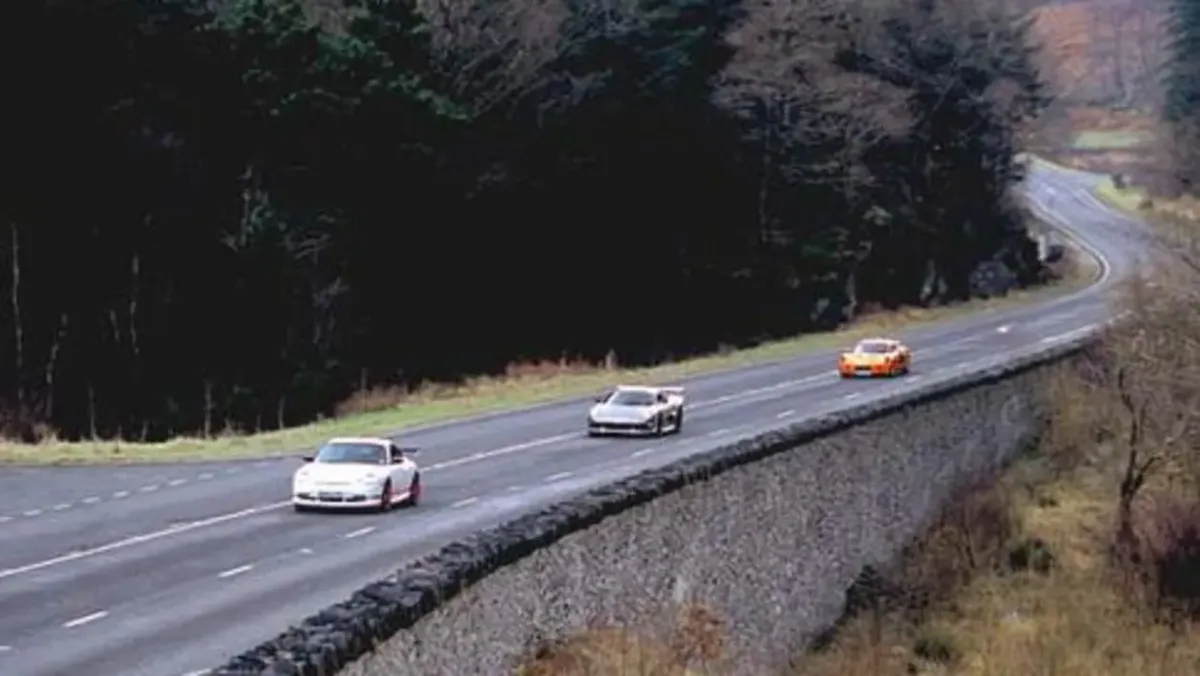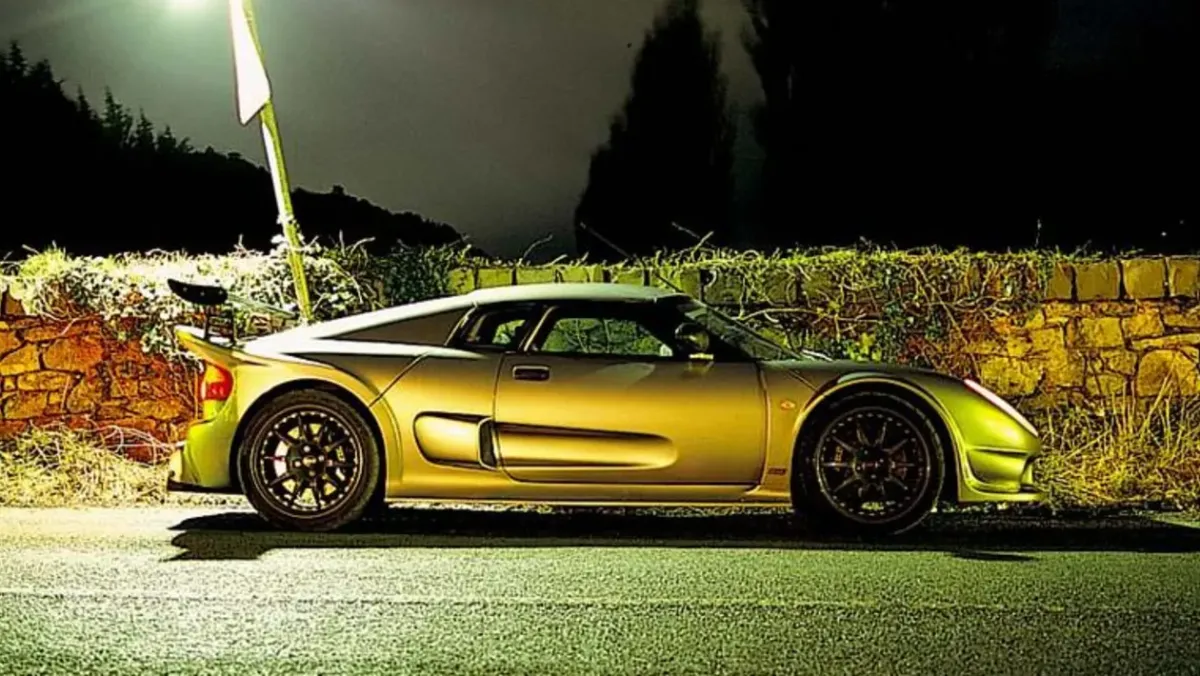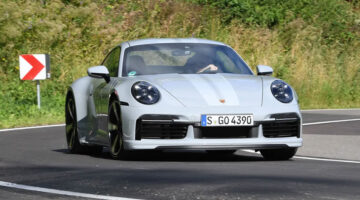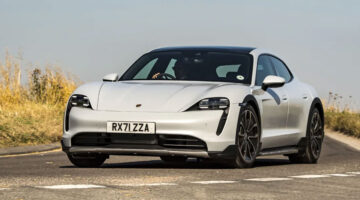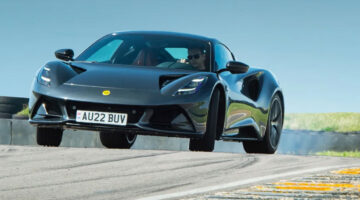This group test was first published in evo back in 2006, where we put the then-new Corvette ZO6 against three deadly rivals
Doubtless you’ve heard about the new Corvette Z06. Heard that it’s coming to the region. Heard about its mighty, 505bhp, 7-litre ‘small-block’ V8. Heard about its race-bred pedigree, outsized 322kph performance and downsized $72K asking price. Heard everything, in fact, except whether this explosive all-American hero-in-waiting is actually any good.
We’d harboured noble intentions of being able to fill you in on that last, vital nugget of information next month, after driving the Z06 against a few choice rivals at its official European launch in the south of France. However, all thoughts of illicit comparison tests and a spot of winter sunshine went straight out of the window when that inveterate car collector and friend of evo, Simon Draper, told us of his latest acquisition: an acid yellow Corvette Z06, run-in and proudly wearing local number plates. Better still, he was happy for us to drive it on roads of our choice against any competitors we cared to bring along. Bingo!
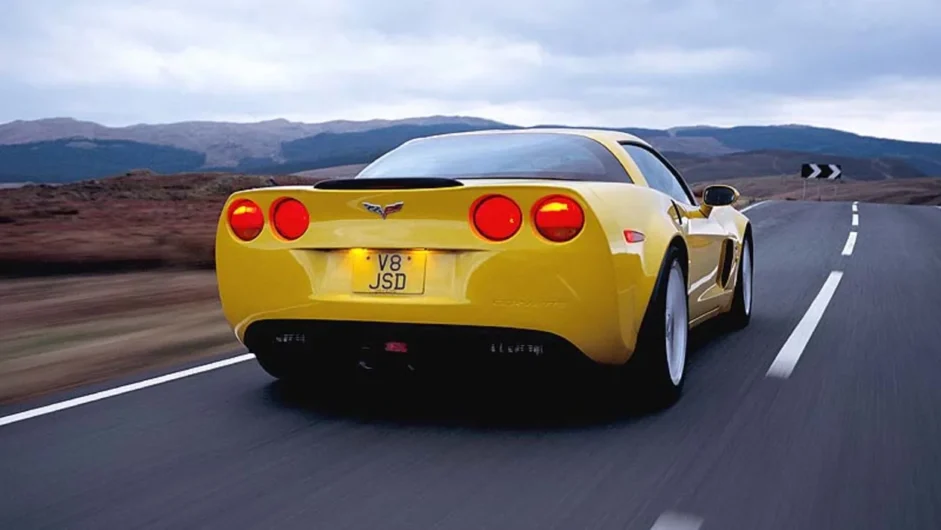
Intrigued and enthralled at the prospect of discovering what this fastest-ever Corvette is like, and on local roads at that, we were then surprised at how hard it was to come up with a relevant, representative bunch of cars with which to test the Vette’s mettle. But then how do you pigeonhole a car that’s designed and manufactured in the USA, packs the power of a supercar and the engineering focus of a homologation special, and yet costs little more than a premium-brand executive saloon? With great difficulty is the simple answer.
Judged purely on power and performance, and putting price aside, we considered the Ferrari 575 HGTC and Porsche 911 Turbo as the ultimate benchmarks, but with both cars in their twilight years, we concluded it would be better to leave that particular showdown for their imminent successors, the 599 and 997 Turbo. Judged purely on price, this flagship Vette sits comfortably in cooking 911 Carrera or soon-to-be-launched Jaguar XKR territory, but as you delve into the development of the Z06, such opposition seems increasingly mainstream as a more focussed, specialist and decidedly hardcore machine begins to emerge from the spec sheet.
In the words of Dave Hill, Corvette’s long-time chief engineer, ‘The Z06 is the dividend from competing so successfully in endurance racing’, and while it’s not a pure homologation special, the Z06 has been developed in conjunction with Chevrolet’s dominant C6-R race car.
Consequently, the Z06 is a totally unique machine that owes little to the basic C6 Corvette, which given our underwhelming experience of Chevy’s purported Porsche-beater, can only be a good thing. Impressively, every aspect of the Z06 has been honed and refined, developed to reduce weight, increase rigidity, boost power or sharpen dynamics.
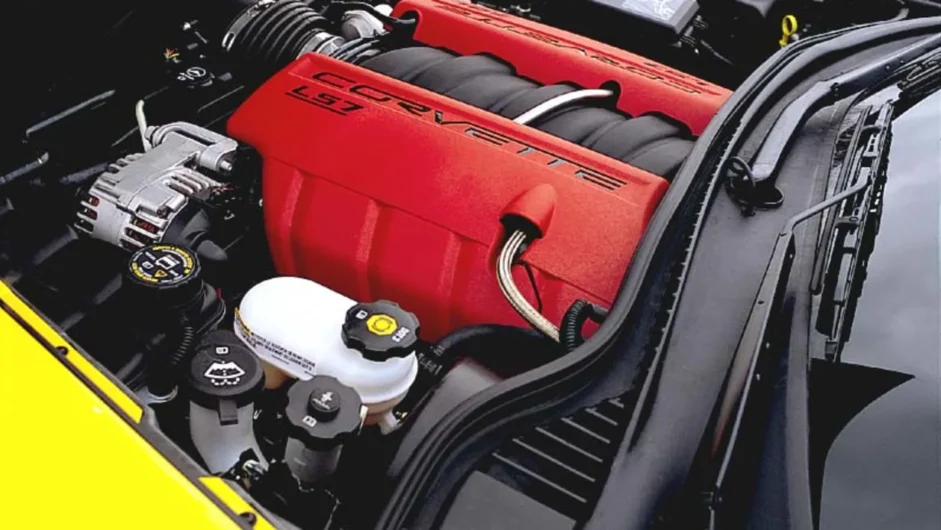
At its core is the LS7 engine, a hand-built 7-litre version of Chevrolet’s legendary small-block V8. Featuring a unique block casting; titanium conrods, pushrods and exhaust valves; ported cylinder heads; a forged steel crankshaft and dry-sump lubrication, it’s an engine every bit as special as the best units from the M Division or AMG.
Structurally the Z06 is just as trick, with an aluminium frame for the body structure in place of the standard Corvette’s steel item, and hydroformed aluminium chassis rails complete with cast suspension mounting points. The engine and some of the front suspension is mounted to a unique magnesium subframe, or ‘cradle’, which saves further weight and helps achieve a 49:51 weight distribution, as does the relocation of the battery to the luggage area.
Further weight-saving measures include minimal sound deadening, front wings and wheelarch liners made from carbonfibre, and a floor formed from a balsa wood core skinned with carbonfibre sheets. It’s a huge amount of effort for what, on paper at least, appears to be a kerb weight saving of just 22kg, but it’s easy to forget that much of the initial weight savings have been offset by the Z06’s bigger wheels, tyres and brakes, dry-sump oil system and big-bore exhaust, all of which are heavier than the standard C6 components. Besides, at a modest 1420kg, the Z06 is impressively trim, weighing the same as a 997 Carrera S, and less than a Ferrari F430.
Factor-in the small matter of 505bhp and 475lb ft with which to propel it, and it’s small wonder this Corvette is nothing less than a ballistic device, hitting 100kph in 3.5sec, 100 in less than 8sec (in the hands of US magazine Motor Trend), and reckoned by Chevrolet engineers to be good for a monstrous 318kph. Few cars promise more pace, even at four times the price, but it was the Z06’s uncompromising dynamic focus rather than its supercar-matching speed that shaped our decision to range three of our favourite and most uncompromising driver’s cars against it: the new but familiar supercharged Lotus Sport Exige Cup, Noble’s ballistic M400 and Porsche‘s last great specialist 911, the GT3 RS.
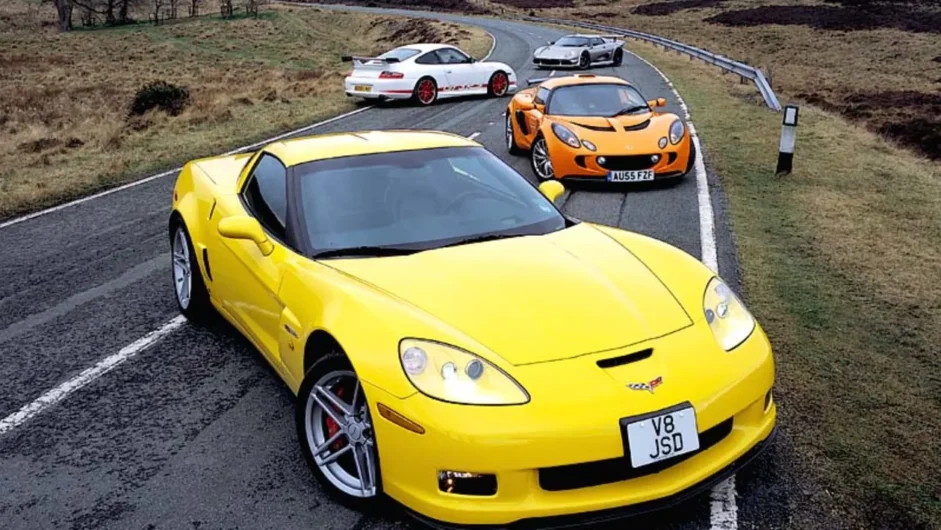
Street racers all, and as tough a test of the Corvette’s charisma, tactility and point-to-point ability as we could muster. As for the venue, and given the timeframe, only Wales would do, but rather than hightail it up the M6 we’re going to head for the Severn Bridge and make our way up through Wales, sampling our favourite roads in the south (the A449 north from the M4 towards Raglan before joining the A40 towards Crickhowell then heading across the moors near Llangattock, scene of our ‘Car of the Decade’ test back in evo 066) before continuing along the A470 to Builth Wells, Rhyader, Llangurig, Dolgellau, Blaenau Ffestiniog and on to our regular routes around Betws-y-Coed and Denbigh.
Our first rendezvous point is Beachley, directly beneath the mighty Severn Bridge. Draper and evo associate editor Tomalin are making their way across from Tetbury in the Corvette and Exige, while I’m making my own way from an overnight stop at Castle Combe in the Noble. That leaves the Porsche, which will be absent today but is set to join us at breakfast-time tomorrow, ready for a final head-to-head with the Corvette and providing ample incentive to complete the schlep up through Wales.
Scraping the early-morning ice from the M400’s windscreen allows time for the twin-turbo V6 to warm its fluids on fast-idle, and also to reflect on how far Noble has come in such a short space of time. True, the M12 isn’t as crisply styled as it should be, and the failings of its interior are well-documented, but these shortcomings do little to diminish Noble’s towering achievement in creating a car that combines deftness and poise with aggression and searing speed. It repeatedly commends itself for tests like this on pure dynamic merit, and is a tribute to Noble’s exceptional engineering skills.
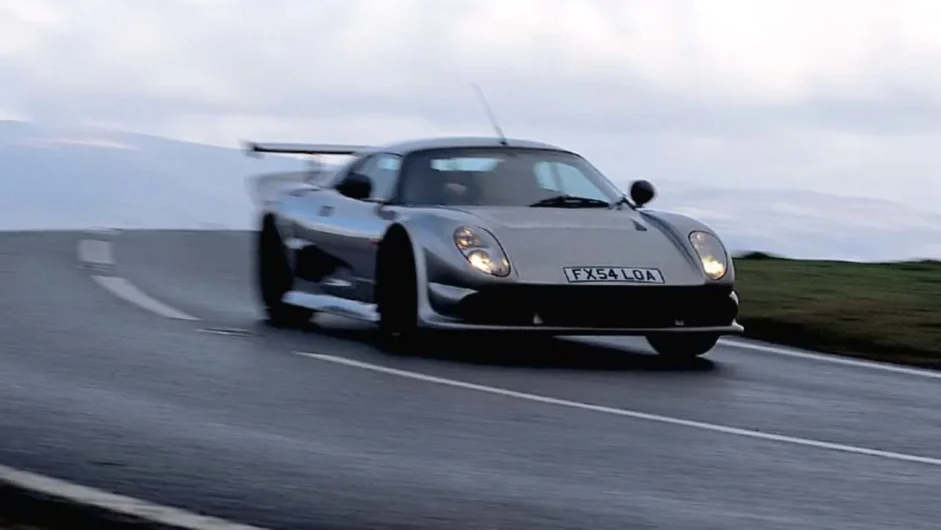
I’ve driven the M400 on many occasions, but still the first few minutes of reacquaintance trigger mixed emotions. The shape is evocative enough, and the stance suitably low-slung, but the door opens and closes with a cheap clack and the interior is a tacky hotchpotch of cheap switchgear and hard mouldings. Another bugbear is the complete lack of luggage space (the set of assorted tailored pouches that sit immediately ahead of and behind the seats are no substitute for a proper boot), which forces you to dump your coat and overnight bag on the passenger seat.
In these respects the new M14 can’t come soon enough. But then, as always with a Noble, you start the thing up, pull away and almost immediately forgive (or at least temporarily forget) its stylistic and ergonomic failings. Irresistibly involving, the M400 is one of those rare cars that immerses you in feedback from the off.
The steering tingles with feel, the supple, pliant chassis courses with information from the tyres and road surface, while the gloriously organic engine lives and breathes just behind your shoulders. It’s not at all intimidating and has no worrying traits, tricks or foibles that you need to be wary of or make allowances for. It’s an honest car with transparent dynamics, and though the drive to Beachley offers little opportunity to explore the M400’s ultimate performance, it’s done more than enough to whet my appetite for the open roads that lie on the far side of the Severn Bridge.
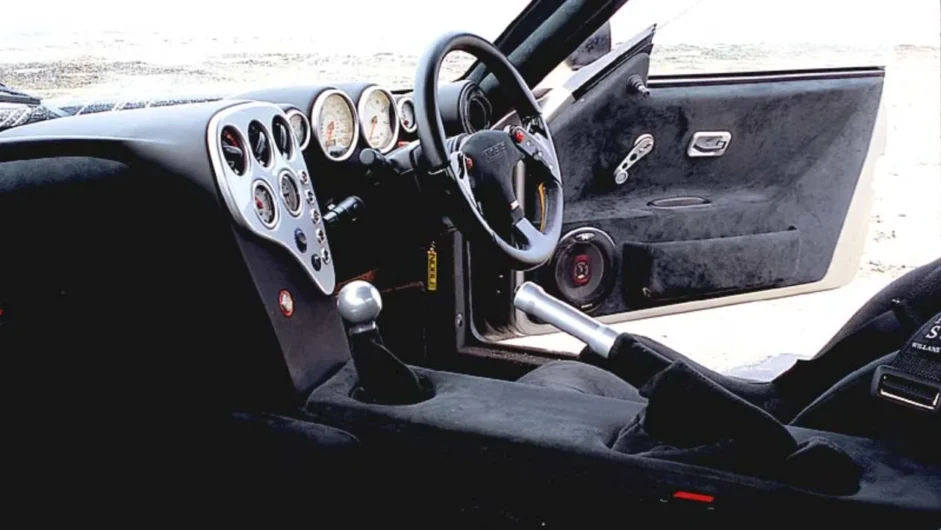
After crossing the bridge in convoy we spend a rather intimidating half an hour or so in its shadow while Gus arranges a static shot of the Exige. Parked on the slipway and with the vast span of bridge reaching overhead, the already diminutive Lotus looks tiny, a sharp slice of citrus orange sparkling in the morning sunshine. This is our first try of the new Lotus Sport 240 Cup, although to be honest it’s little more than a thinly veiled re-issue of the original limited-edition 240R.
Much of the specification is shared, including the 240bhp supercharged engine and Öhlins two-way adjustable suspension. In fact there’s little to distinguish it from the original, save the wheels (which are less-striking silver versions of the normally black standard Exige rims), a less gaudy interior, new decals and a freer choice of body colour. Of course there are detail specification changes. Some, such as the addition of traction control and ProBax seats, are part of the ’06 model-year changes. Others, such as the fitment of a limited-slip differential as standard and the no-cost option of a roll cage and ignition cut-off switches (neither of which is fitted to this test car) underline Lotus Sport’s intention for this Exige to be used on trackdays and in club-level sprinting, hillclimbing and racing.
It’s a steely, hard-edged machine, even by Lotus’s standards, and is a welcome addition to the range, even if the $55,000 price tag is something of a jaw-dropper. Static shot done, we resume our journey. There’s a stretch of motorway and plenty of dual-carriageway to negotiate before the roads get interesting, but until they do there’s ample opportunity to give the Noble’s throttle a good old prod. It might have humble beginnings, but the Roush-built 3-litre twin-turbo Ford V6 is an absolute cracker; lusty enough at low revs and positively rampant when the turbos are spooled.
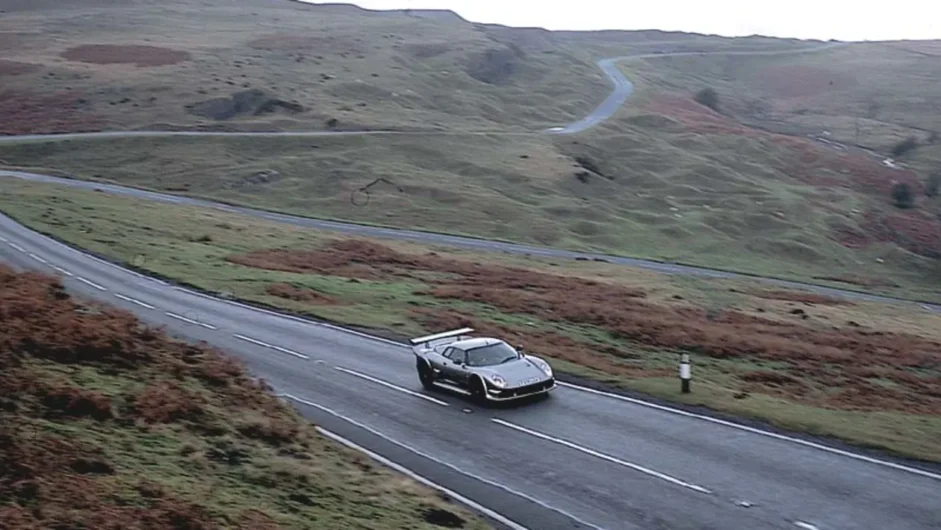
It sounds and feels like a Porsche 911 GT2, acceleration growing exponentially with each delicious rush of boost pressure, every gear more vivid and addictive than the last. What’s more, despite the slick, chill tarmac and trackday-biased Pirelli P Zero Corsa tyres, the M400 finds a surprisingly firm footing, only breaking traction under genuine provocation, underlining the sense that so long as you don’t get too greedy with the throttle the Noble won’t bite. Approaching Crickhowell and the fast, open roads around Llangattock, the Noble comes into its own, soaking up the bumps and ridges, tacking sharply into the tighter twists and turns. It’s here that the M400’s tactility counts, those moments where you’re feeling for turn-in or squeezing for traction on the exit of a corner.
Even in the rain the Noble keeps its poise, despite no traction control, stability system or ABS, and while the tail can kick out or go light under power, the M400’s low mass and progressive breakaway make it intuitive to rein-in and thrilling to exploit. Swapping the Noble for the Lotus fosters an immediate, simultaneous sense of loss and gain: loss because, effective though the supercharged Toyota engine unquestionably is, 243bhp and 174lb ft is no match for 425 and 390; gain because the Exige is beautifully fashioned from wonderful materials, embellished with immaculately conceived details and shot-through with even more delicate responses. And, sorry to be sensible here, equipped with a decent-sized boot.
Charging along these deserted hill-roads is a challenge the Exige relishes, especially now that it has traction control to back-up the ABS brakes. True, the totally analogue Noble proves such modern electronics don’t add to the experience, but like seatbelts, crash helmets and car insurance, you don’t miss ABS (and, to a lesser extent, traction control) until you really need it, at which point you’ll either swerve successfully around the suicidal sheep with wide eyes and a pulsing brake pedal, or spend the next few hours contemplating your cadence braking technique while picking wool and Barnsley chops from your car’s splintered bodywork.
Put simply, when an anti-lock system is as well judged as the one behind the Exige’s rock-solid, feelsome pedal, any argument against it for road use is bloody-minded folly. The traction control is also just-so, relaxed enough to allow you to feel like you’re in control, and refraining from intervening until you’ve generated enough slip to warrant a quarter-turn or so of corrective lock.
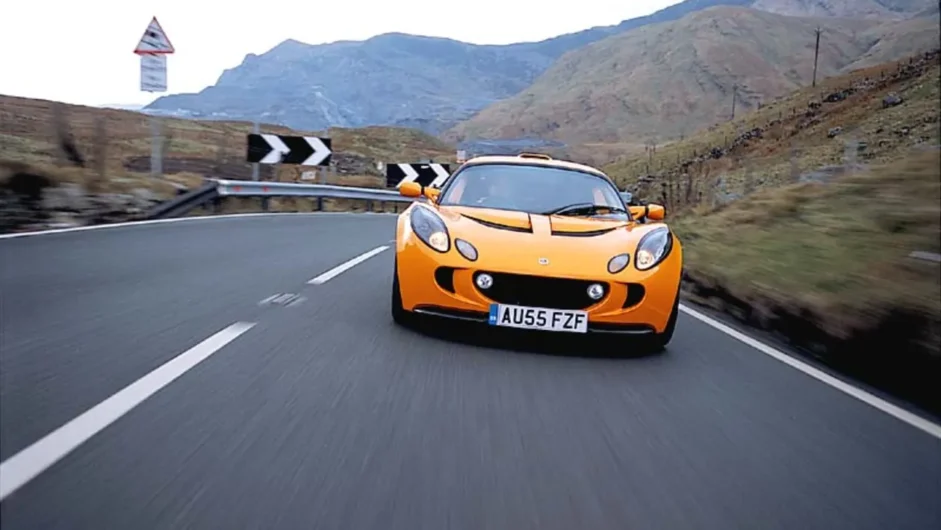
Even when it does cut in, the power isn’t strangled, rather it’s slightly constricted, exhaust popping with the staccato stammer of an F1 car, engine still delivering some useful forward motion. Through quicker corners it doesn’t manifest itself at all, even when you begin to feel some gentle understeer begin to build. It pays to remember that it’s a traction control system, rather than a stability control system that you’re attempting to lean on at this point, for there’s nothing to temper the Exige’s trajectory should you manage to induce a more serious slide, be it understeer or lift-off oversteer.
Despite the disparity in power and torque outputs, both the Noble and Exige respond surprisingly well to less-than-gratuitous revs and deliver a satisfying swell of accelerative urge throughout the mid-range. Both have rapid, accurate, short-throw gearshifts too, the Exige’s just shading the Noble’s thanks to a tighter and more precise cross-gate feel. All-out it’s the Lotus that really demands high revs to deliver its best, the highly-strung Toyota unit finding a demented vigour beyond 8000rpm that’s faintly scary, as is the noise, which is corrosive in its intensity at the top-end, merely buzz-saw violent at all other times.
Fun for five minutes, unpleasant after ten. An hour on the motorway and you’ll be reporting Lotus to Amnesty International. Noise aside, the lasting impression of the 240 Cup is a car that flows with effortless poise and economy of input. You don’t so much guide the Lotus by turning the wheel as by varying the pressure with which you squeeze its rim. You can feel each individual wheel and tyre following the contours of the road, sense changes in surface texture and grip through the varying levels of background noise that permeate the aluminium tub. It’s a malleable car, able to mould itself not only to the road and the conditions, but also to your mood. When you’re in the zone, it’s hard to tell where you stop and the car begins.
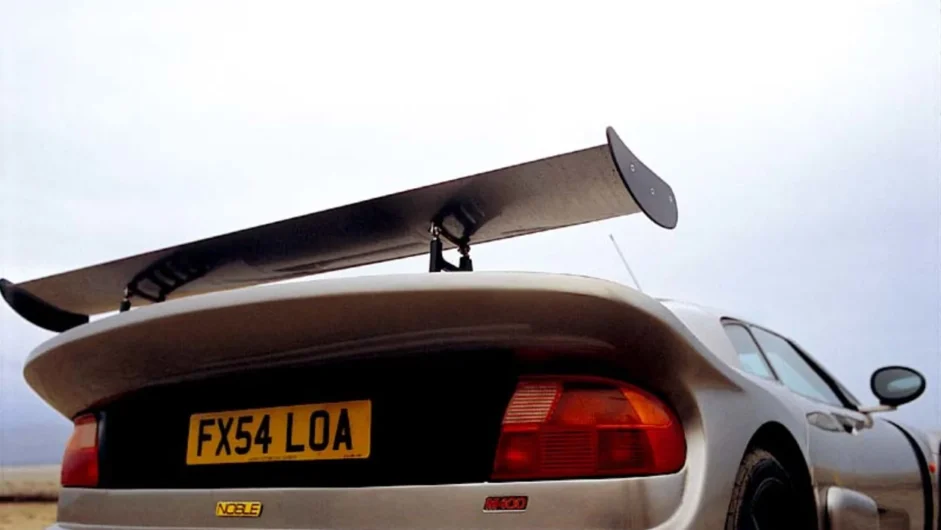
By the time we arrive at our overnight stop at the Groes Inn, both the Noble and the Lotus have impressed. The Noble is the more incendiary, the more visceral when you squeeze your foot to the floor, but both it and the less explosive but even more sensitive Lotus are poignant reminders that the very best driver’s cars temper raw speed with precision and involvement.
The Z06 needs to be exceptional to impress in this company. It’s at an entirely civilised (at least by Gus’s standards) 7.30am that Gregory and I wander outside the Groes Inn after our early breakfast. There’s plenty of photography left to complete, and although I managed a stint in the Corvette yesterday the roads weren’t brilliant, so we’re planning to get a few hours’ photography and driving completed before meeting-up with Draper, Tomalin and a bleary-eyed Bovingdon, who has sliced across from Birmingham after a night on the tiles.
We’re also expecting Porsche owner Simon Butterworth to join us and, just as I’m about to climb into the Corvette, the car park fills with the dry, abrasive and unmistakable engine note of a 911 GT3 RS. He’s earned a breakfast, so we send Butterworth in to join Draper, Tommo and Bosher for a plate of sausage, bacon and eggs.
Even in a pub car park, the way the Z06 sits is a lesson in subtle menace, rear wheels filling the arches with a tweak of negative camber, ride-height squeezed, body drawn Lycra-tight around the chassis. Pierced by additional intakes and vents, the nose and flanks bear testament to the Z06’s increased respiratory and cooling needs, while oversize cross-drilled discs and ingot-sized callipers shine behind thin-spoke cast-spun alloy wheels.
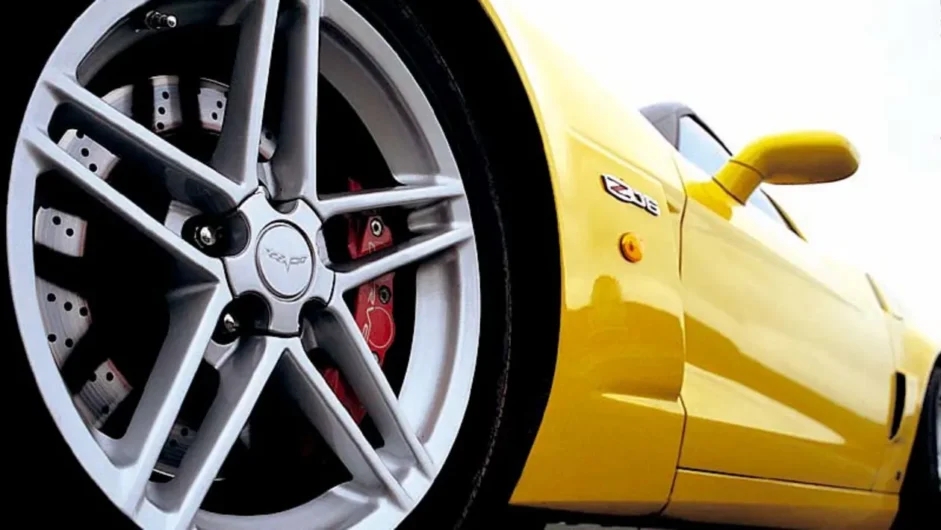
At the rear a stubby black Gurney flap tops the abruptly chopped tail, while visible within the inner pair of stub exhausts lurk the sprung flaps of noise-friendly bypass valves, subtle hints of the thunder to come. Inside, the Z06 shuns classic road-racer austerity, instead offering an impressive level of creature comforts. The seats are generously padded, supportive and comfortable, while dual-zone air-conditioning, Bose sound system, colour screen satnav and a capacious load area make it both extremely habitable and surprisingly practical, even though the result is a pretty mainstream interior ambience.
Once in, you sit low and flat, an impression heightened by the Corvette’s apparent width. It’s intimidating at first, especially when you catch sight of the vast, sculpted bonnet stretching out before you, plunging wheelarches jutting like Kate Moss’s cheekbones. The big, brightly illuminated analogue instruments are clear and bold, the 7000rpm tacho a new addition necessitated by the LS7’s unprecedented hunger for revs. Supplemented by a head-up display (HUD), which includes an endlessly amusing lateral g meter, the driver’s-eye view of the Z06 is undeniably impressive.
Although the Z06 has a key, you don’t actually need to use it. Simply having it in your pocket is enough to unlock the doors, disarm the immobiliser, prime the electrical systems and illuminate the starter button, which glows an inviting shade of green.
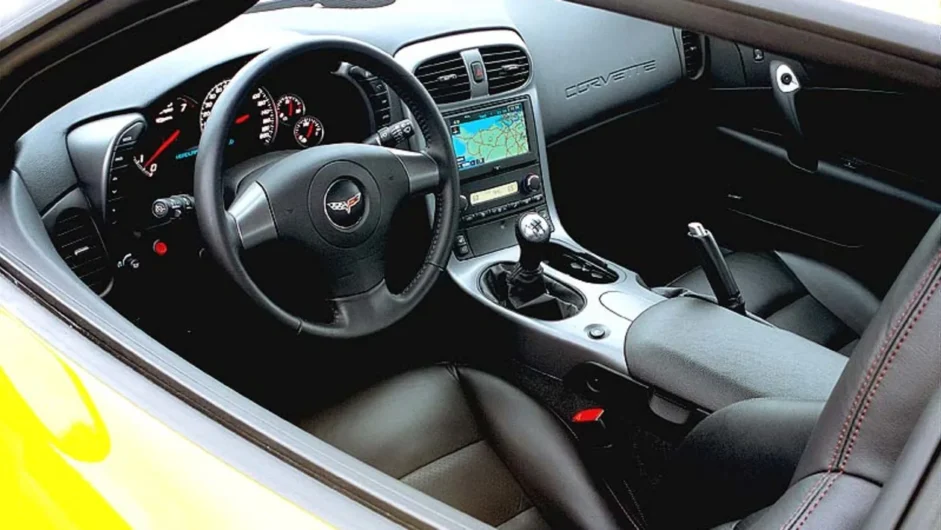
Depress the weighty clutch pedal, finger the button and the 7-litre (or 427 cubic inches in classic muscle-car parlance) fires with a muffled thump before settling into a civilised idle. It’s surprisingly polite, actually, and though clearly of big displacement, the Corvette’s heart has a smooth, soft-edged pulse quite unlike the Porsche’s metallic chunter, the chesty gurgle of the Noble or the waspish buzz of the Lotus.
As you pull away and make your first tentative forays through the gears, you’re immediately struck by the deliberate, unhurried feel of the Tremec six-speed gearshift. It’s not ponderous or obstructive, but you know it’s not the sweetest or the quickest stick to stir around the gate. Chevrolet would point to strengthened internals to cope with the Z06’s bruising power and torque, but I’d point to the Ford GT’s transmission, which has one of the sweetest and most delicate gearshifts around, despite having to cope with even greater power and torque.
While the chunky, industrial gearshift is a mild disappointment, you soon discover that the LS7 motor ripples with so much muscle it renders most of the ratios redundant anyway. It truly is a Goliath of an engine, pulling with immense, effortless urgency, literally from tickover, and delivering the kind of performance that makes even the Noble feel almost toy-like. This is one stupendously quick car. The gearing is hugely tall, with first stretching to 100kph if you push the tacho needle into the redline, while second will take you to 145kph without breaking sweat. Sixth is good for a theoretical and faintly ludicrous 507kph.
In any other car such gearing would be absurd, but what’s genuinely shocking is that the LS7 motor makes as much sense of its ratios (sixth gear aside) as any of the other three cars here. Consequently on most roads, even quite twisty ones, you tend to find a gear and stick with it. Third delivers an unbeatable combination of low-speed tractability and savage acceleration while also having the reach to worry a wrung-out Exige, but for a truly surreal experience, fourth is the gear of choice, for should you have the inclination, it’ll haul relentlessly and with genuine conviction from walking pace right the way through to 273kph. A useful trick, I’m sure you’ll agree.
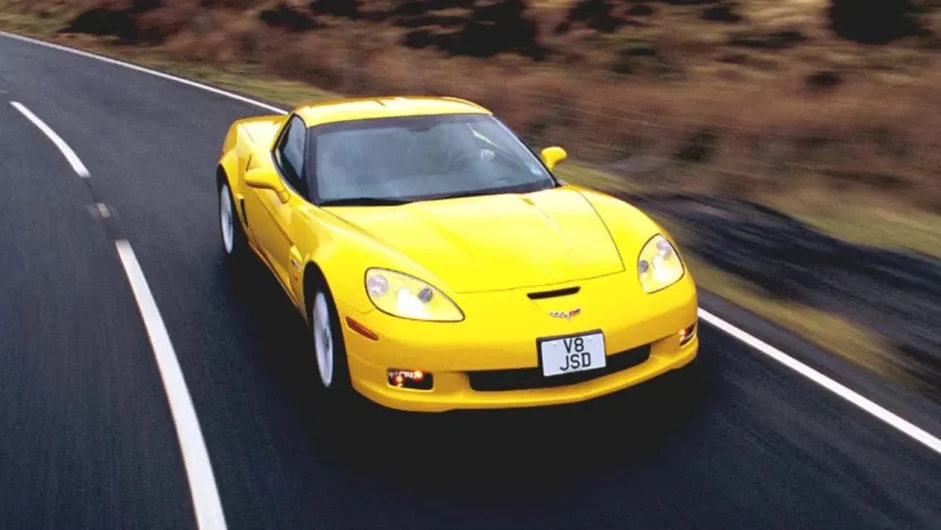
The Corvette’s brakes are also worthy of particular mention, not only for their exceptional stopping power and satisfying pedal feel, but also because they utilise no fewer than 20 separate pads… Rather than having a conventional arrangement with a long single-piece pad on each side of each disc, the Z06 utilises an individual pad under each calliper piston – and there are six-piston callipers up front, four-pots at the rear.
Out on our well-worn test route heading across from the A5 to Denbigh they face a stern test, as does the chassis, for the high speeds, sharp compressions, tightening-radius bends, mid-corner bumps and nasty camber changes conspire to expose flaws like no other roads we know. There’s no doubting the Corvette’s ability to put its ample power and torque onto the tarmac, for those gargantuan 325/30 ZR19 rear Goodyears have formidable bite.
It doesn’t feel as big and cumbersome as the standard C6 either, thanks to steering that has improved feel and a more linear response, along with damping that asserts more control over the body and doesn’t go to war with the road when you try and hustle it on a less than smooth surface. It’s also easier to place, and settles into a corner more readily than the C6, but sharp mid-corner bumps can still upset the Z06’s poise with a buck that seems to kick across the front and rear transverse composite leaf springs in turn, the front-end reacting a split second before the rear.
It’s a trait rather than a mortal failing, for it requires nothing more than for you to accept it and ride it out, but it takes some getting used to. But then so does the Porsche. It’s been well over a year since I last drove a GT3 RS, and clearly my memories of it have been corrupted by the countless intervening drives in various 997 models, for the 996 RS is shockingly busy, fidgeting over bumps you simply don’t notice in the Corvette (or the Noble, or the Lotus).
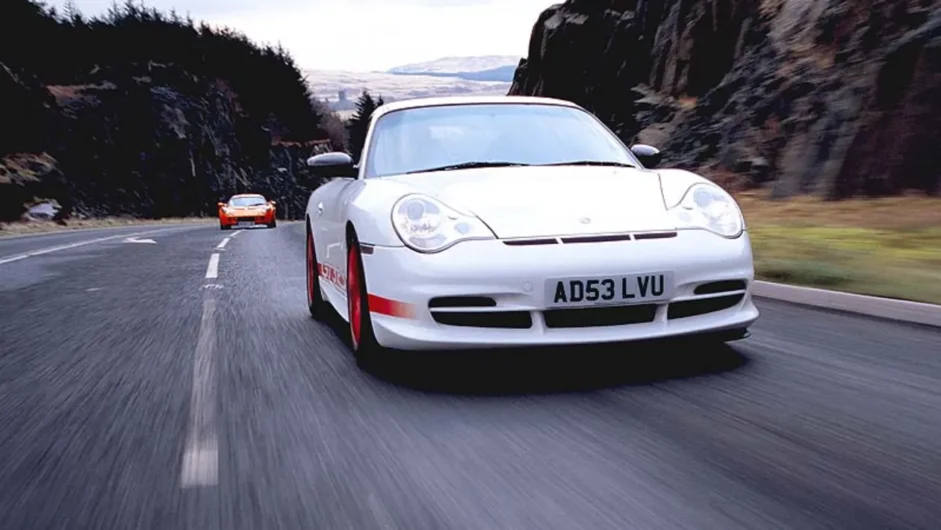
The nose bobs, the steering-wheel wriggles, the tail squirms and shimmies, the whole car seemingly alive, sensitive to the point of paranoia. Of all the cars here it feels like the most intimidating, the most tricky, the most overwhelming. Take a deep breath, allow yourself to calm down, and you begin to make sense of the RS. Relax your grip of the steering wheel and far from being wrenched from your hand, the storm of feedback calms. It feels less nervous, less distracted, and as you feel the car begin to react to the road you can filter the ‘noise’ from the genuine feedback.
Driving the RS, like any 911, is learning what to ignore and what to take heed of. Even so, attacking the road in the RS demands more effort and concentration than any of the other cars. More inputs and corrections too, your hands working a constant stream of minute nudges and hints of lock into the steering, your right foot working in unison, with a slight lift here and there to get the weight distribution working in your favour.
It’s a physical car to drive, and too punishing to live with on a daily basis, despite the stereo and the air-con and the boot space. But the harder you work, the more obedient and responsive the car gets; the quicker you go, the more immersed you become. And that, ultimately, highlights the Z06’s only major failing. The Porsche is flawed, demanding a very particular driving style, but eventually you find a way to interpret its signals, and that in turn enables you to feel comfortable with its behaviour and get the most from it.
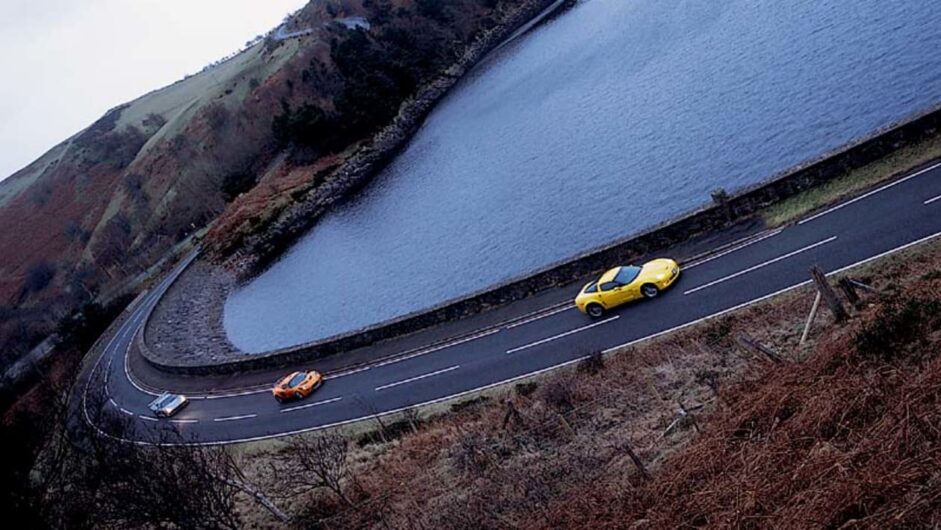
The Noble and Lotus are paragons of benign brilliance, allowing you to simply get in them and enjoy them. In the Z06, despite the manifest improvements over the C6, there’s an underlying aloofness that ensures you never feel inclined to feel for its limits. And while it has the grunt, grip and stopping power to keep pace, or even set the pace, without needing to dig that deep, it’s this lack of ultimate tactility, its inability to fully engage you, that means it never truly delivers those genuine moments of inspiration that define the others.
While it’s mildly disappointing to report that the Z06 isn’t the purebred road-racer its detailed development and exotic specification led us to believe, we remain awed at its pace, bowled over at the level of improvement over the standard Corvette C6, and incredulous at its bargain price and how it combines 500bhp with everyday practicality. It might not be America’s answer to the 911 RS, but when the new Porsche 997 Turbo is launched later this year, we know what we’ll be measuring it against.
Specs
| Corvette Z06 | Lotus Exige Cup 240 | Noble M400 | Porsche GT3 RS | |
| Engine | V8 | In-line 4-cyl, supercharged | V6, twin-turbo | Flat-six |
| Location | Front, longitudinal | Mid-mounted, transverse | Mid-mounted, transverse | Rear-mounted, longitudinal |
| Displacement | 7011cc | 1796cc | 2968cc | 3600cc |
| Bore X Stroke | 104.8 x 101.6mm | 82 x 85mm | 98 x 79.5mm | 100 x 76.4mm |
| Cylinder Block | Aluminium alloy | Aluminium alloy | Aluminium alloy | Aluminium alloy |
| Cylinder Head | Aluminium alloy, sohc, two valves per cylinder | Aluminium alloy, dohc, four valves per cylinder, VVTL-i | Aluminium alloy, dohc per bank, four valves per cylinder | Aluminium alloy, dohc per bank, four valves per cylinder |
| Fuel and Ignition | Electronic engine management, sequential fuel injection | Lotus engine management, multi-point fuel injection | Electronic engine management, multi-point fuel injection | Bosch engine management, multi-point fuel injection |
| Max Power | 505bhp @ 6200rpm | 243bhp @ 8000rpm | 425bhp @ 6500rpm | 375bhp @ 7400rpm |
| Max Torque | 475lb ft @ 4800rpm | 174lb ft @ 7000rpm | 390lb ft @ 5000rpm | 284lb ft @ 5000rpm |
| Transmission | Six-speed manual, rear-wheel drive, traction control, Active Handling | Six-speed manual, rear- wheel drive, lsd, traction control | Getrag six-speed manual, rear- wheel drive, Quaife lsd | Six-speed manual, rear-wheel drive, lsd |
| Front Suspension | Double wishbones, composite leaf spring, dampers | Double wishbones, coil springs, dampers, anti-roll bar | Double wishbones, coil springs, dampers, anti-roll bar | MacPherson struts, coil springs, dampers, anti-roll ba |
| Rear Suspension | Double wishbones, composite leaf spring, dampers | Double wishbones, coil springs, dampers, anti-roll bar | Double wishbones, coil springs, dampers | Multi-link, coil springs, dampers, anti-roll bar |
| Brakes | Cross-drilled and vented discs, 355mm front, 340mm rear, ABS | Cross-drilled and vented discs, 282mm front, 282mm rear, ABS | Cross-drilled and vented discs, 330mm front, 330mm rear | Vented discs, 350mm front, 330mm rear, ABS |
| Weight Kerb | 1420kg | 930kg | 1060kg | 1330kg |
| Power to Weight | 361bhp/ton | 264bhp/ton | 407bhp/ton | 286bhp/ton |
| Max Speed | 305kph+ (claimed) | 250kph (claimed) | 297kph (claimed) | 305kph (claimed) |
| Basic Price | $72,000 | $55,095 | $67,075 | $90,000 (used) |
| Rating | 4.5 | 5 | 4.5 | 5 |
| 0 to 100kph | sub-4sec (claimed) | 3.9sec (claimed) | 3.5sec (claimed) | 4.4sec (claimed) |
This article originally appeared at evo.co.uk
Copyright © evo UK, Autovia Publishing

